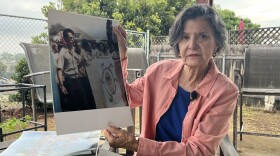MELISSA BLOCK, host:
This is All Things Considered from NPR News. I'm Melissa Block.
ROBERT SIEGEL, host:
And I'm Robert Siegel. Many of the words we use to talk about politics come to us from Greek - politics for one, also democracy and anarchy. But it's hard to think of any English word, of whatever origin, to describe what's been going on in Greece for the past 11 days. Riots in Athens have become routine ever since police shot and killed a teenager on December 6. Derek Gatopolous of the Associated Press is a reporter based in Athens. And Derek Gatopolous, from the AP accounts today, it seems that rioting has just become part of daily life there at this point.
Mr. DEREK GATOPOLOUS (Reporter, The Associated Press): It certainly has. And chaos, that's another Greek word for you. Yes, I mean, there's been trouble, either riots or sporadically violent protests, in Athens and in other cities.
SIEGEL: It's the Christmas shopping season now. People are still shopping in Athens despite this?
Mr. GATOPOLOUS: Well, they haven't been. A lot of shops have been closed during the riots. But today pretty much every shop was open, and there were a lot of shoppers out, sometimes even walking through tear gas to get home with their shopping bags.
SIEGEL: You were out today watching the rioting and reporting on it?
Mr. GATOPOLOUS: Yes, I was. I was out for several hours.
SIEGEL: What did it look like? What's the scene like?
Mr. GATOPOLOUS: Well, it was quite bizarre really. It was quite violent. There was a very large, peaceful protest, as is quite common. And then, you know, several hundred youths broke off from that and started throwing Molotovs and rocks at the police. There was, you know, street battles and, you know, little - young people smashing marble panels from buildings to throw at the police, and so on. And by the end of the day, they had been pushed back and sort of cordoned off into several city blocks, and the rest of the city was Christmas shopping.
SIEGEL: Now, does the - you say the commercial life of the city, obviously, in the center of Athens has been paralyzed by this until today. The administrative life of the city, has it gone on relatively normally or has it been stopped? How do you describe what's happened to daily life there?
Mr. GATOPOLOUS: Well, again, it's almost like the same kind of thing. You'd get total normality next to total chaos sort of existing side by side. So it's the same kind of thing. I mean, also, many offices and shops have been destroyed, so this is also hurting services. I mean, a post office very close to my house is completely burned and, you know, all the letters were - Christmas cards and so on were destroyed. And so, it's sort of potluck, really.
SIEGEL: Is it clear that the young people who were throwing things at the police or rioting, that they have an agenda or a clearly understood list of grievances?
Mr. GATOPOLOUS: It's not so clear. I mean, there have been demands, but you get the sense that generally the demands are sort of an afterthought. I mean, the people are asking for a review of the police and how they use firearms or whether they should even carry firearms. People are asking for emergency support for low-income families. All these things are being put forward quite forcefully, but I'm not sure even if this happened that that would definitely end the riots.
SIEGEL: Do people in Greece think that this might destabilize the government or lead to a change of government?
Mr. GATOPOLOUS: Yes. The conservative government has been in power - was re-elected a year ago, and they have a majority of one seat in Parliament. So there is a sense that if this isn't handled soon, and certainly if it goes into the Christmas week or something, that this, in the end, could topple the government. There is that sense.
SIEGEL: It sounds like you're describing something that could just go on without any grand finale to it all. It just seems to persist.
Mr. GATOPOLOUS: I think there is the sort of quiet hope that it will stop with a, you know, a big rainstorm or maybe Christmas - you know, for the actual Christmas Day, and then people will just, you know, sort of taper off. But certainly, it has gone on an incredibly long time. I mean, to have riots, you know, with a couple of days break for two weeks is - I can't remember it ever happening. It's unprecedented.
SIEGEL: Well, thanks for talking with us today.
Mr. GATOPOLOUS: Thank you.
SIEGEL: It's Derek Gatopolous, a reporter for the Associated Press in Athens. Transcript provided by NPR, Copyright NPR.





